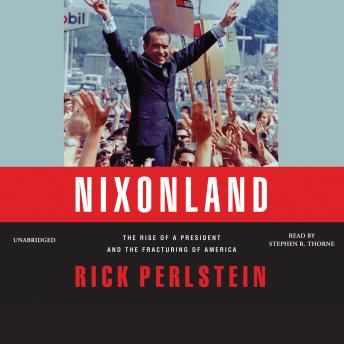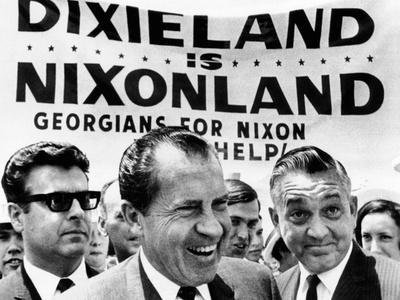
One need not fully support Perlstein’s thesis in order to find the book both intriguing and thought-provoking.

And the gripping narrative frequently proves gratuitously melodramatic. But coverage of his early years is far too rapid to serve as a meaningful introduction to his life. The book begins in earnest with colorful coverage of the 1965 Watts riots, and Perlstein soon peers back in time to back-fill important details of Nixon’s early life. It is a contention not easily dismissed, but many readers will appreciate that there is nothing new about America’s polarized politics (or culture). Perlstein’s overarching thesis, tying together two parallel narratives involving American society and Nixon himself, is that Richard Nixon masterfully recognized, exploited and magnified cultural divisions which then persisted long past his presidency. Divided into four broad sections (corresponding to the national elections in 1966, 1968, 19) this book explores social trends and unrest deriving largely from Vietnam and racial tensions.

Readers will quickly discover that “Nixonland” is more a cultural and social history of the United States than a biography of Nixon. Perlstein is currently working on a fourth book in this series on America’s political and social fabric. Perlstein’s most recent book “ The Invisible Bridge: The Fall of Nixon and the Rise of Reagan” picks up where “Nixonland” ends. His first book “ Before the Storm: Barry Goldwater and the Unmaking of the American Consensus” explores American culture in the 1960s. When Bill Clinton famously declared "the era of big government is over" in 1996 he was conceding the obvious - in fact it had ended at least a decade earlier.Historian and journalist Rick Perlstein’s widely-praised “ Nixonland: The Rise of a President and the Fracturing of America” was published in 2008. In Nixonland conservatives mostly set the agenda and framed the debate. The only two term Democrat elected in that period was hamstrung for three-quarters of his Presidency by a Republican Congress. Of the ten Presidential elections between 19, Republicans won 7. The politics of Nixonland proved very successful for the Republicans, if not for America.

On the one side the "Silent Majority".On the other side are the "liberals." Perlstein writes, "What Richard Nixon left behind was the very terms of our national self-image: the notion that there are two kinds of Americans. Welfare queens, Willie Horton, Swiftboats all Nixonland tactics, all designed to cleave Americans along racial and cultural lines. Nixonland, the book, ends in 1972, but Nixonland, the place, endured, through the 70s and 80s, up until George W.


 0 kommentar(er)
0 kommentar(er)
